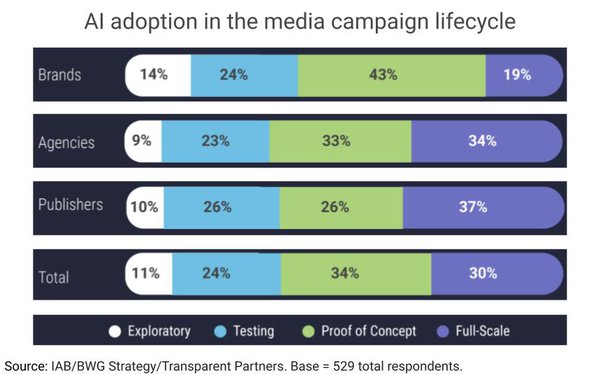
Despite a plethora of challenges that artificial
intelligence (AI) brings to the advertising industry, advancements in the technology will change even the fundamentals of how brands, agencies and publishers reach and interact with consumers.
Not all in the industry are ready for the change, according to findings released today by the Interactive Advertising Bureau (IAB).
The IAB’s State of Data 2025: The Now, The
Near, and The Next Evolution of AI for Media Campaigns provides the first industry benchmarks on AI use, adoption, and perceptions, as well as challenges, opportunities, and future needs within the
media campaign lifecycle.
Created and published by the IAB in partnership with BWG Global and Transparent Partners, the research was designed to evaluate the market’s readiness
for the transformation. About 500 experts across the buy- and sell-sides of the industry participated in the study.
advertisement
advertisement
AI as been a key part of digital advertising for years, but 70%
of agencies, brands and publishers have yet to fully implement the technology across media planning, activation, and analysis.
Looking at why brands have delayed implementation, 60% cited cost
as the biggest factor that influence the AI tools they should use. Adoption will come for many, but more than 80% that have not expanded the reach of the technology have a timeline as to when they
will. Half expect full integration in the next two years.
Agencies lead in AI adoption, and about half have already adopted audience identification and segmentation. Along with brands,
between one-quarter and one third use generative AI to build segments with synthetic data by filling gaps where data signals are no longer available.
Publishers are using AI to manage
supply and analyze audience segments. Forty-one percent use AI for inventory predictions and forecasting, while 40% use it to attribute engagement across devices and platforms, and 39% use it to
analyze content and audience behavior.
Companies are planning to use AI to advance measurement. Agencies want to automate campaign management and leverage advanced analytics to make smarter
media investments. Brands are planning opportunities to detect issues more quickly and integrate data better.
Agencies and publishers feel that AI delivers on its promises, with 70% saying it
meets or exceeds expectations. Brands view AI as slightly less effective and reliable, according to the study.
AI does the most to deliver efficiency, effectiveness and reliability in audience
segmentation and data aggregation. Ad-fraud prevention, brand safety and contract management rank the lowest.
Data readiness, security and tool fragmentation are some of the hurdles that
companies face. Nearly two-thirds cite significant challenges from complexity of setup and maintenance, and data quality, to job displacement concerns.
The research found that the top five
challenges include 62% who cite complexity of setup and maintenance, 62%, data security risks; 61%, lack of AI knowledge; 60%, concerns about AI accuracy and transparency; and 58%, legal governance
and compliance.
Advertisers acknowledge that AI transparency is becoming a concern, and 51% of brands are concerned about a lack of transparency into how agencies and publishers use AI on
their behalf.
These concerns can be mitigated with guidelines and standards. But despite AI adoption concerns and challenges, only half of companies said they are developing solutions to
address them, and only 49% of agencies, brands and publishers are using or plan to use one of 18 key solutions to overcome AI adoption challenges for media campaigns.
Those solutions include
everything from creating a roadmap for AI projects and budgeting controls to conducting fairness and bias audits, the IAB says.
The research found the top five solutions are as follows: 49%
cited strategic roadmaps for AI use over time, 49% cited a list of approved AI use cases, 40% said defined KPIs specifically for AI solutions, 36% said regular training and updates for AI tools, and
33% said mandatory human oversight for AI outputs.
The industry recognizes the need for standards, with more than half of agencies, brands and publishers citing data privacy and protection, as
well as accuracy and reliability as the most valuable standards.
Fifty-six percent view data privacy and protection protocols as important, while 56% cite accuracy and reliability, 43% cite
transparency standards, 38% cite ethical use guidelines, and 36% cite regulation compliance framework.